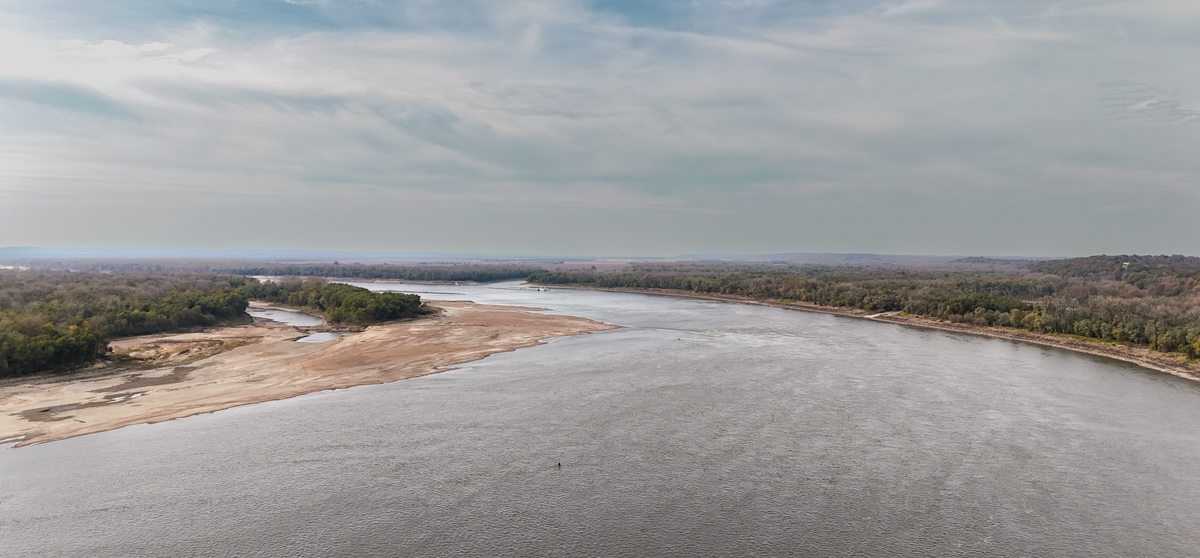From Washington City, Captain Amos Stoddard is given orders to pick up tools at Fort Fayette and proceed to Kaskaskia as part of a military buildup along the Mississippi. President Jefferson criticizes Senator Ross’ attempt to raise a militia to take New Orleans by force and has little hope of giving Thomas Rodney a federal appointment.
Fort Kaskaskia with its view of Mississippi River traffic and the “American Bottoms” of Illinois was originally the site of a French fort built in 1759 during the Seven Years War. In 1803, the American fort played a pivotal role in the Lewis and Clark Expedition.
Stoddard’s Orders
WAR DEPARTMENT 19th February 1803.
Amos Stoddard
Sir
You will call on Mr. Hook [Moses Hooke] the Assistant Military Agent to furnish your Company with twenty good Axes, three broad Axes, two Addz’s, two tennant Saws, two whip-Saws, two augers of each size from ½ inch to two inches, three band saws, two gouges, six strong carpenters chissells, One fore plain, One jointer, one smoothing plane, two carpenters rules, ten grubing hoes, ten common hoes six strong spades and an assortment of saw files, a grindstone, and ten pound of chalk, fourteen common and two Horsemens or wall tents.
At Kaskaskia there is a company and a Surgeons Mate with a medicine chest &ca an annual supply, for both Companies, of clothing, medicine, Hospital stores and Stationary will be forwarded in season. It will probably be most advisable if ordered up the Mississippi, to make your first stand at the place where Captain Bissells Company is posted at Kaskaskia, until you shall have decided on the most suitable scite for a Post near the mouth of the Illionois, and until you shall have made the necessary arrangements for the reception of your company.[1]In his introduction to the autobiography of Amos Stoddard, Robert A. Stoddard suggests “By the term, ‘the reception of your company,’ it is supposed he is referring to Capt. Lewis … Continue reading
You will take with you two Brass field pieces, with a suitable proportion of ammunition. As it is not yet fully determined, whether you will go up the Mississippi or not it may be proper to prevent your mens knowing that such a measure is in contemplation.
I am &c a[2]Henry Dearborn to Amos Stoddard in Clarence Edward Carter, Territorial Papers of the United States, Vol. VII, The Territory of Indiana, 1800–1810 (Washington, 1948), 85–6.
Henry Dearborn‘s strategy was for Stoddard’s and Bissell’s two companies to establish an American fort near the mouth of the Missouri. After Louisiana’s Purchase, the objective became a fort on the western side of the Mississippi. Stoddard facilitated the official transfer (see March 9, 1804) of the Upper Louisiana Territory and then served as its Commandant.
Louisiana War Movements
Washington Feb. 19. 1803.
Dear Sir [Thomas McKean]
. . . . .
mr Ross, so strongly marked by popular rejection in his late competition with you, and to retire from the Senate within a few days by a like rejection by the representatives of his state, is setting himself up by his war-movements here as if he were their friend, & the only person who has their confidence. I have been told he has declared the people of his quarter would go of their own authority & take N. Orleans, & that he would head them himself. but I rather suppose it sufficient, that a measure has his approbation, to produce their distrust of it.[3]Thomas Jefferson to Thomas McKean, Founders Online, National Archives, founders.archives.gov/documents/Jefferson/01-39-02-0461 accessed 23 May 2022. [Original source: The Papers of Thomas Jefferson, … Continue reading
Rodney’s Rejection
for mr T. Rodney I should certainly be glad to do any service; but really do not foresee any vacancy likely to happen where he could be employed.[4]Ibid.
Notes
| ↑1 | In his introduction to the autobiography of Amos Stoddard, Robert A. Stoddard suggests “By the term, ‘the reception of your company,’ it is supposed he is referring to Capt. Lewis and the Corps of Discovery.” Stoddard’s company of artillerists were sent to the Illinois territory to be prepared for many exigencies during this fluid time in American history. Robert A. Stoddard, The Autobiography Manuscript of Major Amos Stoddard (San Diego: Robert Stoddard Publishing, 2016), 63. |
|---|---|
| ↑2 | Henry Dearborn to Amos Stoddard in Clarence Edward Carter, Territorial Papers of the United States, Vol. VII, The Territory of Indiana, 1800–1810 (Washington, 1948), 85–6. |
| ↑3 | Thomas Jefferson to Thomas McKean, Founders Online, National Archives, founders.archives.gov/documents/Jefferson/01-39-02-0461 accessed 23 May 2022. [Original source: The Papers of Thomas Jefferson, vol. 39, 13 November 1802–3 March 1803, ed. Barbara B. Oberg. Princeton: Princeton University Press, 2012, pp. 552–555.] |
| ↑4 | Ibid. |
Experience the Lewis and Clark Trail
The Lewis and Clark Trail Experience—our sister site at lewisandclark.travel—connects the world to people and places on the Lewis and Clark Trail.
Discover More
- The Lewis and Clark Expedition: Day by Day by Gary E. Moulton (University of Nebraska Press, 2018). The story in prose, 14 May 1804–23 September 1806.
- The Lewis and Clark Journals: An American Epic of Discovery (abridged) by Gary E. Moulton (University of Nebraska Press, 2003). Selected journal excerpts, 14 May 1804–23 September 1806.
- The Lewis and Clark Journals. by Gary E. Moulton (University of Nebraska Press, 1983–2001). The complete story in 13 volumes.


